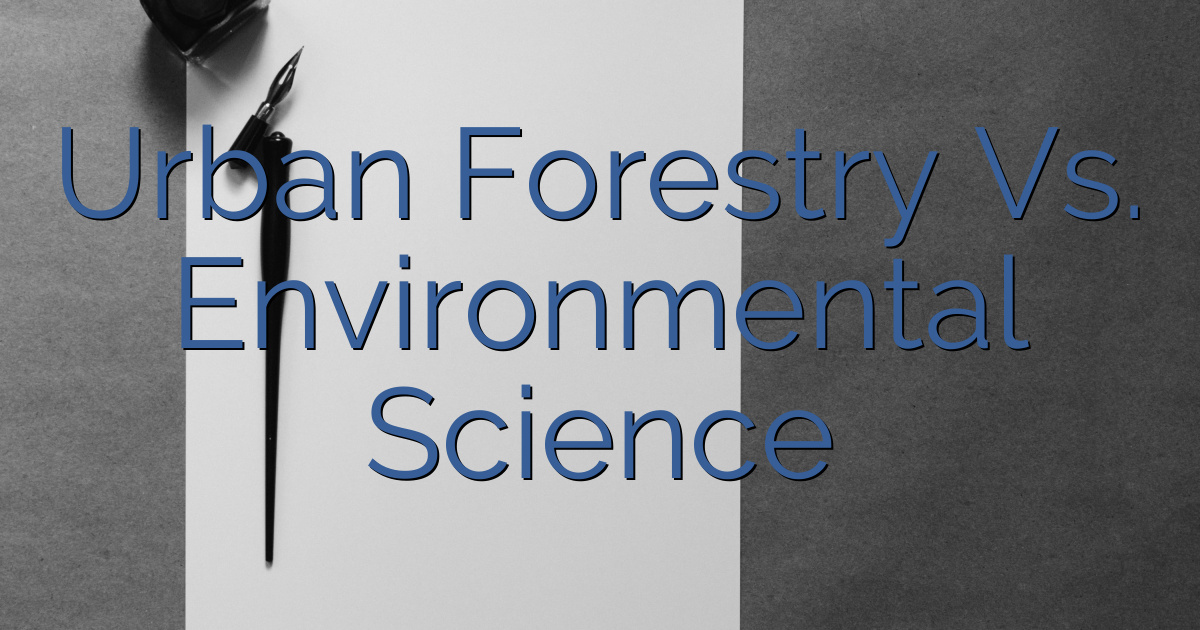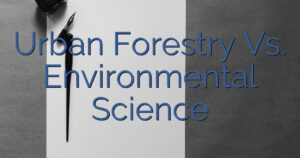 So, you’re torn between Urban Forestry and Environmental Science, huh? It’s a tough decision, but fear not! This article will provide you with all the information you need to make an informed choice.
We’ll compare the curriculum, skills developed, career opportunities, and even salary potential in both fields. By the end, you’ll have a clear understanding of the similarities and differences between these majors, helping you decide which path aligns best with your interests and aspirations.
Let’s dive in!
So, you’re torn between Urban Forestry and Environmental Science, huh? It’s a tough decision, but fear not! This article will provide you with all the information you need to make an informed choice.
We’ll compare the curriculum, skills developed, career opportunities, and even salary potential in both fields. By the end, you’ll have a clear understanding of the similarities and differences between these majors, helping you decide which path aligns best with your interests and aspirations.
Let’s dive in!
Table of Contents
Key Takeaways
- Urban forestry focuses on tree management and conservation in urban areas, while environmental science covers a broader range of topics including ecology and pollution control.
- Urban forestry graduates can work as urban foresters or park managers, while environmental science graduates can pursue careers as environmental consultants or conservation scientists.
- The curriculum for urban forestry includes courses in tree care, urban ecology, and landscape design, while the curriculum for environmental science includes courses in environmental policy, climate change, and water resource management.
- Urban forestry develops skills in tree management, urban planning, and environmental policy analysis, while environmental science develops skills in ecological systems analysis, pollution control, and conservation strategies.
Overview of the two majors: Urban Forestry Vs. Environmental Science
If you’re trying to decide between urban forestry and environmental science as majors, it’s important to understand the key differences between the two fields. When it comes to curriculum comparison, urban forestry focuses on the management and conservation of trees in urban areas. You’ll learn about tree biology, urban ecosystem management, and urban planning. On the other hand, environmental science covers a broader range of topics, including ecology, pollution control, and sustainability. The curriculum includes courses in biology, chemistry, and geology. In terms of job prospects, urban forestry graduates can work as urban foresters, arborists, or park managers, while environmental science graduates can pursue careers as environmental consultants, conservation scientists, or environmental planners. Both fields offer a range of opportunities, so consider your interests and career goals when making a decision.Overview of the curriculum of the two majors – Urban Forestry Vs. Environmental Science – including keyword "courses"
The curriculum for each major includes a variety of courses that cover different aspects of the field. When comparing elective courses in urban forestry and environmental science, there are notable differences. In urban forestry, students often have the opportunity to take courses such as urban tree care, urban ecology, and landscape design. These courses focus on the management and conservation of urban green spaces, with an emphasis on understanding the ecological and social factors that influence tree health and urban ecosystems. On the other hand, environmental science majors typically have a broader range of elective options, including courses in environmental policy, climate change, and water resource management. These courses provide students with a comprehensive understanding of the environmental challenges facing our planet and the scientific tools needed to address them. Despite these differences in elective courses, both majors share core requirements in biology, ecology, and environmental science fundamentals, underscoring the interdisciplinary nature of these fields.Overview of coursework, assessments, and ‘projects’
In both majors, students are expected to complete various projects and assessments as part of their coursework. These coursework assessments and projects are designed to enhance the learning experience and provide students with practical skills that they can apply in their future careers. The curriculum of both urban forestry and environmental science majors includes a mix of theoretical knowledge and hands-on experiences. Through coursework assessments, students develop skills such as data analysis, problem-solving, and critical thinking. These skills are highly valued in a wide range of industries and job roles. Career opportunities in both fields are abundant, with industries such as environmental consulting firms, government agencies, non-profit organizations, and research institutions offering diverse job roles. The salary potential varies depending on factors such as specialization, location, and experience. When choosing between urban forestry and environmental science, factors to consider include personal interests, future goals, and the desired specialization. Exploring the coursework assessments and projects can help you gain insights into the skills developed and the potential career opportunities in each field.Comparison of Skills Developed: ‘skills’
To make a decision between the two majors, consider the skills you’ll develop through coursework assessments and projects. In urban forestry, you’ll gain expertise in tree management, urban planning, and environmental policy. This will equip you with the ability to assess and manage urban green spaces, ensuring their sustainability and health. On the other hand, environmental science will provide you with a broader understanding of ecological systems, pollution control, and conservation strategies. This knowledge will enable you to analyze and address complex environmental issues on a larger scale. Here is a comparison of the skills developed in both majors:- Urban Forestry:
- Tree identification and management
- Urban planning and design
- Environmental policy analysis
- Urban ecosystem assessment
- Sustainable landscaping techniques
- Environmental Science:
- Ecological systems analysis
- Pollution monitoring and control
- Conservation strategies
- Environmental impact assessment
- Data analysis and interpretation
Comparison of Career Opportunities, Job Roles, and ‘industries’
When considering career opportunities, think about the job roles and industries that interest you the most. In the field of urban forestry, there are various career opportunities available. One common job role is that of an urban forester, who is responsible for managing and maintaining trees in urban areas. They work closely with city planners and developers to ensure the proper selection, planting, and care of trees. Another job role in this field is that of a tree care specialist, who focuses on tree health and maintenance. In terms of industries, urban foresters can find employment in municipal governments, consulting firms, and non-profit organizations. These career opportunities allow individuals to make a positive impact on urban environments and contribute to the sustainability of cities.Comparison of Salary Potential in ‘urban forestry’ and ‘environmental science’
In terms of salary potential, urban forestry and environmental science offer different opportunities. While both fields have the potential for fulfilling and rewarding careers, the earning potential can vary based on factors such as experience, education, and job location. To illustrate this, let’s compare the average salaries for urban forestry and environmental science professionals in the table below:| Job Title | Urban Forestry | Environmental Science |
|---|---|---|
| Environmental Scientist | $65,000 – $85,000 | $55,000 – $75,000 |
| Arborist | $45,000 – $65,000 | $40,000 – $60,000 |
| Sustainability Manager | $70,000 – $90,000 | $60,000 – $80,000 |
| Forest Ecologist | $55,000 – $75,000 | $50,000 – $70,000 |
| Wildlife Biologist | $50,000 – $70,000 | $45,000 – $65,000 |
Similarities between the two majors: ‘curriculum’
If you’re considering majoring in urban forestry or environmental science, you’ll notice that the curriculum for both fields includes courses in ecology, biology, and conservation. These foundational courses are essential for understanding the complex interactions between organisms and their environments. In addition to these core subjects, both majors also typically require coursework in environmental policy and management, as well as courses specific to each field, such as urban ecology for urban forestry and environmental impact assessment for environmental science. When it comes to internships, there are similarities between the two majors. Both urban forestry and environmental science offer opportunities for students to gain hands-on experience through internships with government agencies, non-profit organizations, and private companies. These internships provide valuable real-world experience and allow students to apply their knowledge in practical settings.Difference between the two majors – ‘specializations’
To choose between the two majors, consider the different specializations available and how they align with your interests and career goals. In urban forestry, you can specialize in areas such as urban tree management, urban ecology, or urban planning. These specializations focus on understanding and managing trees and green spaces in urban environments, promoting sustainable development and improving the health and well-being of urban communities. On the other hand, in environmental science, you can choose specializations like environmental policy, conservation biology, or environmental chemistry. These specializations involve studying the impacts of human activities on the environment and developing strategies to mitigate these effects. When it comes to job prospects, both majors offer promising opportunities. Urban forestry specialists are in demand for roles such as urban foresters, arborists, and landscape architects. Environmental science graduates can pursue careers in environmental consulting, research, or policy making. Ultimately, the choice between the two majors should be based on your specific interests and career aspirations.Factors to consider when choosing between the two majors: ‘interests’
Now that you understand the difference between specializations in urban forestry and environmental science, it’s time to consider some factors that can help you make a decision based on your interests. One important aspect to consider is the career prospects and job market for each field. When choosing between urban forestry and environmental science, you should consider the following:- Job growth: Explore the projected growth rate for both urban forestry and environmental science careers to determine which field offers better long-term opportunities.
- Salary potential: Research the average salaries in both fields to determine which one aligns with your financial goals.
- Work environment: Consider the type of work environment you prefer, whether it’s spending more time outdoors in urban forestry or conducting research and analysis in environmental science.
- Skills and interests: Assess your own skills and interests to determine which field best aligns with your strengths and passions.
- Industry demand: Investigate the current demand for professionals in each field and identify which one is more in demand in your region or desired location.
What is the difference between Urban Ecology and Urban Forestry in relation to Environmental Science?
Urban ecology and urban forestry both fall under the umbrella of environmental science, but they focus on different aspects of urban environments. Urban ecology studies the interactions between organisms and their environment in urban settings, while urban forestry specifically looks at the management and conservation of trees in urban areas.

